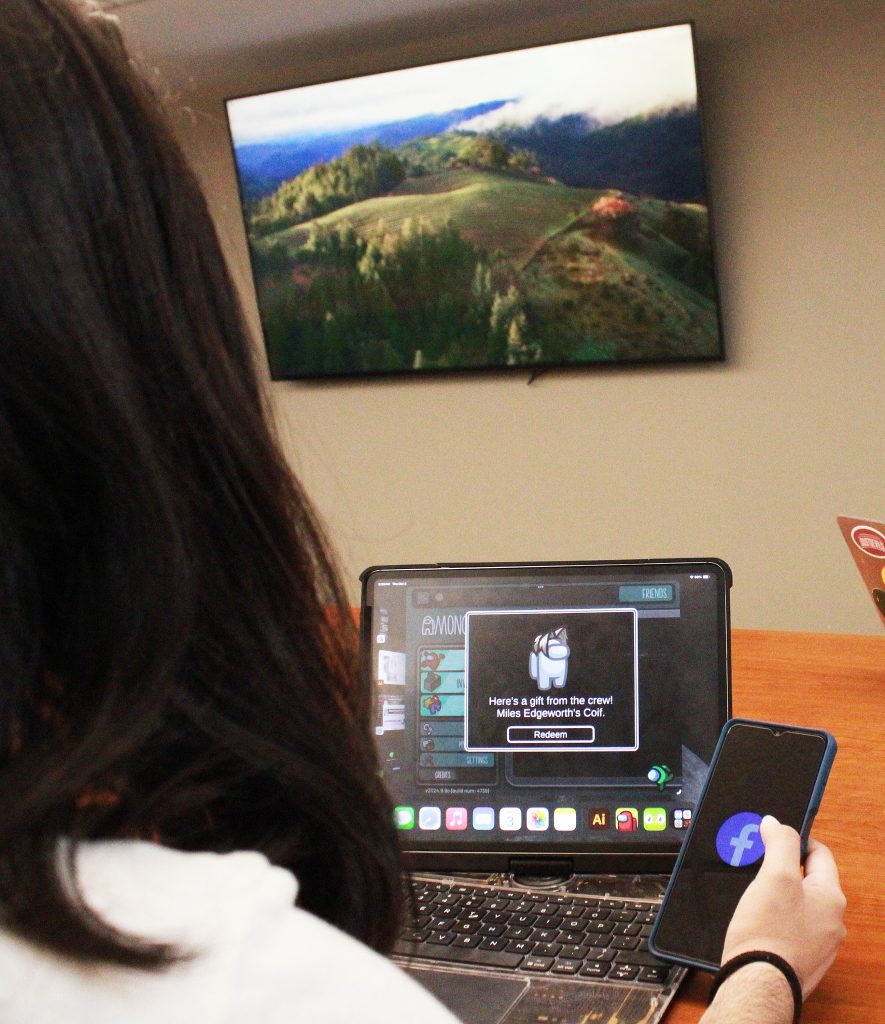EDUCATION: Technology can create distractions despite opportunities, advancements
By Karime Rodriguez
Bridge contributing writer
Published Wednesday, Sept. 11, 2024
Unlike many years ago, technology currently drives much of people’s lives. This is no different from the academic environment.
While some embrace the opportunities of technology, such as artificial intelligence and new versions of learning management systems, others find these things distracting from the learning process.
Texas A&M International University nursing major Carolina Pacheco carries her Chromebook, tablet and phone with her as she studies.

A student uses a laptop and her phone simultaneously in a classroom during this photo illustration taken on Oct. 2.
“No it doesn’t distract me from the lesson, but it happens sometimes when everybody is typing really loud,” Pacheco said. “If I didn’t have technology, it would force me to pay attention and read more because with technology everything is easier to find and navigate through the class-like website we use for questioning and answering.”
TAMIU Lecturer of mathematics Judy Gutierrez has first-hand experience with allowing students to use technology in her class.
“Depending on the need and the class, I allow tablets/laptops, calculators and phones,” Gutierrez said. “I’ll have students use TopHat, so they’ll need their phones to sign in and, as well, if they don’t have a separate handheld calculator during class discussions.”
She acknowledged the pros and cons of classroom tech.
“It’s a double-edged sword,” Gutierrez said. “Students who use it for the intended purpose will see benefits. It will help them keep up with the material and focus on the lesson. I provide students with electronic copies of blank class note templates; so, if they have a tablet or laptop, they can see the notes in front of them and even write on top of them.
“Having this resource as an option allows them to not have to write every detail. In turn, [it lets] them focus on the main concepts of discussion. On the flip side, you will have students who open their devices to watch movies or play games instead. If students want to learn, they will make sure they set themselves up to do so. Overall, from my experience, I have seen more positives with the use of technology than negatives.”
Part of Director of Academic Technology Patricia Abrego’s role with ELearning at the University is to oversee the ways and teaching methods where technology can be used in the classroom to benefit students and faculty alike in the educational process.
“Technology is highly important within the University,” Abrego said. “The integration of technology into every classroom, including the use of lecture-capture software for faculty, underscores its significance in the teaching and learning process.
“These technological tools not only facilitate a more dynamic and interactive learning environment, but also ensure that educational resources are readily accessible to students. For instance, the ability for faculty to record lectures and make them available for later viewing on Blackboard.”
She also serves as the Quality Matters coordinator. QM is a process faculty undergo to align online courses with learning objectives in order to improve online-learning outcomes.
“Technology serves as a major key to students’ studies, rather than a problem,” Abrego explained. “The utilization of technology, as evidenced by the provision of lecture-capture software and interactive applications, like Top Hat, significantly enhances the learning experience. It provides students with flexible access to course materials and lectures, allowing them to engage with content more deeply and at their own pace.”
Abrego also explained when technology can become problematic.
“Technology becomes a problem for college students under several circumstances, often related to overuse, reliance and the potential for distraction,” she said. “The availability of the internet and social media can lead to procrastination and distractions, significantly reducing study efficiency and focus. Multitasking with digital devices during lectures or study sessions can impede understanding and retention of information.”
